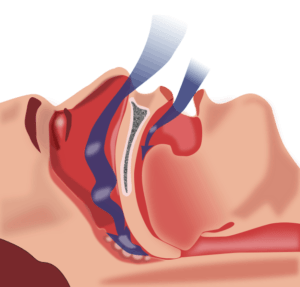Oxygen is life. Sleep apnea deprives your brain of this critical nutrient dozens of times a night. Gasping for precious air, it’s like drowning in your sleep.
And it isn’t pretty. (Note: The videos below and in the link that follows may be upsetting to some.)
And lest you think apnea is something that only affects older or overweight folks, check out this clip.
Seeing what obstructive sleep apnea (OSA) actually looks like, it may seem less than surprising that the condition has been linked to many systemic health problems, from high blood pressure to cognitive impairment, chronic inflammation to cardiovascular issues; even, according to research, some cancers.
And though CPAP is still often touted as the best apnea treatment, new research suggests that, on its own, it doesn’t necessarily reduce the risk of other systemic health problems. As Reuters reported of this new JAMA study, while it did improve sleepiness and some measures of well-being, it didn’t improve blood pressure, BMI, blood lipids, blood sugar, or overall quality of life.
Fortunately, there are other ways of keeping the airway open besides forcing air through it as CPAP does. And it’s a good thing, too. Many folks can’t stand CPAP, so wind up doing nothing at all to keep themselves from being repeatedly oxygen-deprived during sleep.
 The goal of any apnea treatment is to keep the airway from becoming blocked. In some cases, excess tissue, the tongue, or lower jaw fall back during relaxation, partly blocking the airway. In other cases, the airway itself may be underdeveloped. (The fact that poor nutrition has led to smaller, narrower jaws is one likely reason why apnea seems to have become more prevalent in recent years.)
The goal of any apnea treatment is to keep the airway from becoming blocked. In some cases, excess tissue, the tongue, or lower jaw fall back during relaxation, partly blocking the airway. In other cases, the airway itself may be underdeveloped. (The fact that poor nutrition has led to smaller, narrower jaws is one likely reason why apnea seems to have become more prevalent in recent years.)
Here’s where dental treatment can be of help via oral appliance therapy, or OAT for short.
Many appliances work by holding the lower jaw in a more forward position, keeping it from falling back and blocking the airway. Some appliances even work to trigger stem cells that are in your jaw joints and tooth sockets, actually making the airway wider so the appliance is eventually no longer needed. (For more on this type of OAT, we recommend Dr. Felix Liao’s recent book Six-foot Tiger, Three-foot Cage.)
OAT is not only more convenient and comfortable than CPAP; it’s effective. One 2015 study in the Journal of Oral Rehabilitation looked at the efficacy of oral appliance therapy in patients who were “non-compliant” with CPAP.
The overall treatment success rate was 75%. There was no significant difference in success rates between patients in the moderate and severe categories (69% and 77%, respectively)….. OA treatment of patients non-adherent to CPAP is efficient and especially promising for the severe OSA group who are at greatest risks for developing serious comorbidities, if left untreated.
A more recent study in the same journal compared mandibular (lower jaw) advancement devices (MAD) with nasal CPAP and found
that there is no significant difference between MAD and nCPAP in their positive effects on self-reported symptoms of common sleep disorders and sleep-related problems in mild and moderate OSAS patients.
Such findings were confirmed by a review earlier this month in the Journal of Dental Sleep Medicine – not to mention a wealth of other research over the past decade plus. (If you’re interested in seeing more, ask us for a list of references next time you’re in the office.)
The weight of the evidence only made it seem right to add OAT to the therapies we can provide in our office. Through recent years, Dr. Glaros has become more and more attuned to both the oral and systemic problems that come with a lack of quality sleep. We’ve blogged about it before, and just last week came news of yet another study suggesting an association between sleep quality and dementia. The more he studied, the more he knew that he needed to add OAT to his practice to provide the comprehensive care his patients deserve.
If you suspect sleep apnea in yourself or a loved one, talk with us about it at your next visit – or make an appointment to come in and find out whether OAT might be a good option for you to improve your overall health through a better night’s sleep.